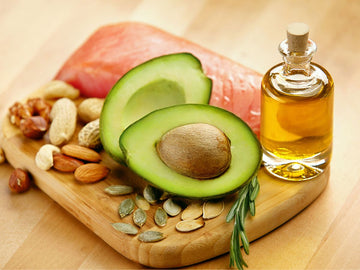Good fats vs. Disassembly the myth that they all get fat.
for Baia Food en Jul 28, 2016
Tabla de contenidos
Many people wonder: Are fats good or bad? Do they all cause weight gain? Should they be eliminated from the diet? Fats (also known as lipids) are a macronutrient that raises suspicion and fear in anyone who wants to watch their figure.
But are these suspicions well-founded? Nothing could be further from the truth! Of course, we have to distinguish between "good" and "bad" fats.
BAD FATS
These are those found in trans or hydrogenated form. Industrial pastries, pre-cooked products, fast food, French fries, and refined vegetable oils are sources of trans fats. which we should avoid at all costs due to their harmful effects on our body and their “love handles” effect.

GOOD FATS
Among the commonly called good fats or unsaturated fats, we find fats monounsaturated and the polyunsaturated.
In turn, within polyunsaturated fats, we can distinguish two types: omega-3 fatty acids and the omega 6Our bodies cannot produce them on their own, so it is essential that we provide them through our diet.

SOME TIPS
- Let's reduce the habits that worsen our lipid profile: smoking, leading a sedentary lifestyle, consuming alcoholic beverages (except red wine and in moderation), becoming overweight (the triglycerides associated with this imbalance HDL levels), and having an inadequate diet lacking in antioxidants and rich in "bad" fats.
- Let's adopt habits that increase HDL production: Here diet plays a fundamental role. We should consume foods rich in omega 3 and omega 6 fatty acids: extra virgin olive oil, blue fish, avocado, hemp seeds, Chia, flax, sunflower, pumpkin, and nuts such as walnuts and almonds. It's important to note that nuts and seeds should always be consumed raw or lightly toasted, unfried, and without salt. Trans fats are often used in frying, thus offsetting their beneficial effects.
- Include antioxidants in your dietLet's not forget the role of antioxidants. They prevent the oxidation of fats and their deposits in the arteries. Foods rich in vitamins C, E, beta carotene, and lycopene are essential for this. ORGANIC AÇAI, the tea of ORGANIC MATCHA, carrots, green leafy vegetables and red fruits among others, have these characteristics.
In short, a healthy diet requires the consumption of good fats. They are a source of energy, provide essential elements for the production of hormones and cell membranes, and act as carriers of vitamins and enzymes (oh, and they don't make you gain weight ;).
If you want to take care of yourself, keep this in mind and don't hesitate to add a handful of seeds, nuts, avocado, and other foods mentioned above to your meals. Your health will thank you!
Alicia Lamothe (Health Coach)





